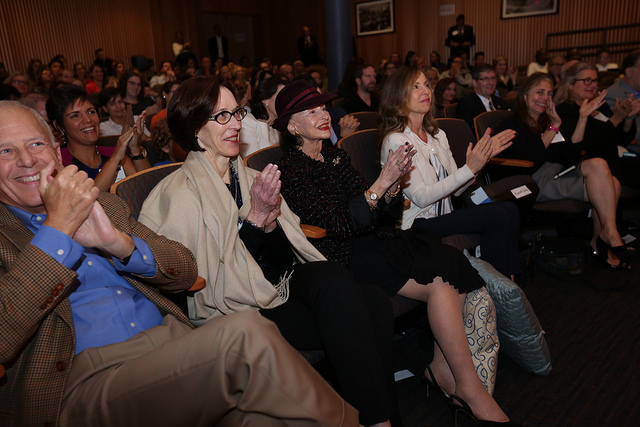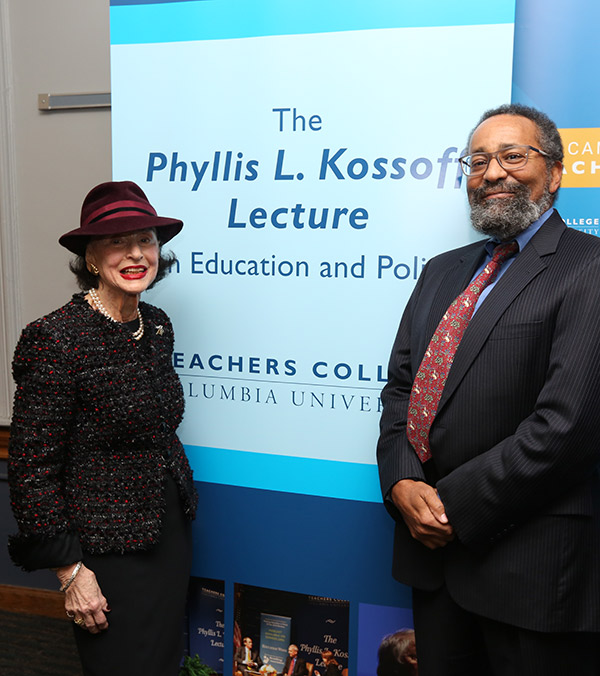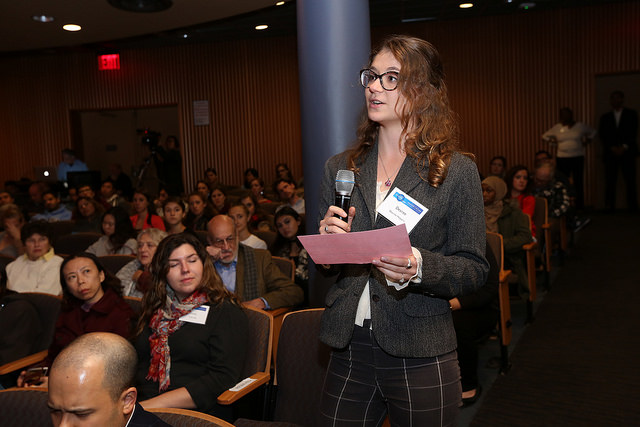A Strong Hand on Educational Inequity: In TC’s Kossoff Lecture, an adviser to Hillary Clinton outlines her views
Hillary Clinton thinks that American schools are succeeding overall, but would bring a “sense of urgency” to addressing the educational inequality that is leaving many children and young adults behind. She believes the federal government should take a strong hand in addressing their plight, which is compounded by a concentration of poverty and segregation.
That is how Christopher Edley, Jr., a senior policy adviser to Clinton, described the Democratic nominee’s educational views during an evening conversation with Teachers College President Susan Fuhrman on October 13th in TC’s Cowin Conference Center. The discussion – this year’s Phyllis L. Kossoff Lecture on Education & Policy – was titled “Taking the Election to School.”
“Secretary Clinton is willing to make a $350 billion investment as part of a compact with America so that children of working families can go to college and graduate without debt.”
— Christopher Edley, Jr., Senior Policy Adviser to Clinton Campaign
Edley and Fuhrman spoke for about an hour. The event was originally intended to pair Edley with an education adviser to Republican nominee Donald Trump, building on the debates Fuhrman moderated at TC in 2008 and 2012 between the education advisers of the two major-party presidential nominees, but the Trump campaign declined TC’s invitation.
“Education plays critical roles in addressing so many challenges we confront, from social and economic injustice, to international conflict and global warming,” Fuhrman said. “Education should be a central topic of discussion in every major political campaign.”
Edley is the Honorable William H. Orrick, Jr. Distinguished Professor at the University of California-Berkeley School of Law, where he previously served as Dean, and Faculty Director of the university's Chief Justice Earl Warren Institute on Law and Social Policy. He also co-founded and serves as President of The Opportunity Institute.
[ Read commentary from the TC community on education in the election. ]
At the start of the evening, he said he was saddened that education was not on the “front burner of this presidential campaign,” an absence he characterized as a “missed opportunity” for Clinton, whom he called “the best educational candidate ever.” Still, he said it was an “unparalleled honor” to discuss Clinton’s educational policies at Teachers College. “TC was not only the first teachers college in the nation, but it is still the best in the nation and on the planet.”

“As president, she'd like to broker a new consensus about a more comprehensive immigrant-education strategy that includes provisions for health care, housing and other social needs.”
Early childhood education. Edley said that the candidate, as a policy expert who relies upon evidence-based solutions, is well aware of the abundant scientific evidence showing that brain development in the earliest years of childhood is crucial. She intends to double the number of children served by Early Head Start programs, he said, and plans to increase federal support for home visiting programs, through which nurses and social workers assist young mothers.
The Federal government’s role in setting education policy. Clinton wants a strong role for the federal government, Edley said, but realizes that Washington must be “innovative and flexible” in working with the states. She would use the “bully pulpit of the presidency to encourage the best ideas from the ground up from the states while insisting upon accountability.”

Charter schools. Clinton supports charter schools that work, Edley says, but thinks failing charter schools should be closed. She feels that successful innovations in charter schools “should be transported to [traditional] public schools,” as the charter school movement originally advocated.
Higher education. Edley said Clinton will work diligently to make public colleges more open and affordable and to ease the debt burden on many college students. She would allow college students to refinance their debts just as homeowners can refinance their mortgages. She would also cap college loan repayments to 10 percent of a student’s income.

After the discussion with Fuhrman, Edley fielded a few questions from students. Desiree Halpern, a master’s degree candidate in International Educational Development, prefaced hers with the observation that more than 42 million Americans are immigrants (including her mother), and that education is their top priority. “What will a Clinton administration do to ensure that America's immigrants get a quality education?” Halpern asked
Edley replied that Clinton is angered by the lack of consensus on how to hold schools accountable for educating students who are English language learners.
“As president, she’d like to broker a new consensus about a more comprehensive immigrant-education strategy that includes provisions for health care, housing and other social needs,” he said. “I think she’ll form a working cabinet group to focus on this issue and also help at the state level.”
As the questions drew to a close, Edley leaned forward in his seat and offered one final thought to the audience: “Don’t forget to vote.” – Robert Florida
Funded by TC alumna Phyllis L. Kossoff, the annual Phyllis L. Kossoff Lecture on Education & Policy has helped establish the College as the nation’s premier address for the national conversation on education. Past Kossoff Lectures have included the first policy address by current New York State Education Commissioner MaryEllen Elia, earlier this year; a debate between the education advisers of the two Presidential nominees in fall 2012; a major policy address by U.S. Secretary of Education Arne Duncan in 2009; a 2009 roundtable discussion that featured then New York State Regents Chancellor Merryl Tisch (Ed.D.’05) and Education Commissioner David Steiner; and policy addresses by two New York City public school chancellors, Dennis Walcott and former TC Cahn Fellow Carmen Fariña.
Kossoff also maintains a pioneering lecture at Hunter’s Roosevelt House Public Policy Institute.
Published Monday, Oct 24, 2016